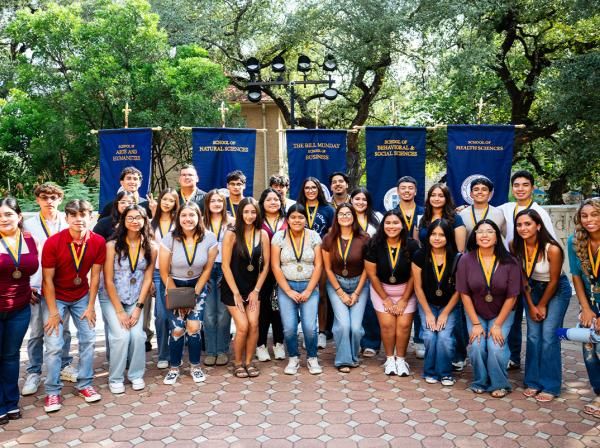How Do I Go to Law School?
If you’re considering a career in law, St. Edward’s University is a great place to prepare. “The most important thing a student can do is have a clear understanding of the legal profession and why you want to go to law school,” says Alex Smith, J.D., the pre-law career counselor.
That sense of purpose appeals to law school admission counselors, but it’s also what will motivate you to do well in your classes, study for the LSAT, and seek out internships in a legal field. Whether you already know exactly what kind of law you want to practice, or you’re just curious about the field, St. Edward’s can help you find your focus.
You’ll Get Personalized Advising
Students who are interested in law start by meeting with Smith, who practiced law for several years before coming to St. Edward’s. You’ll talk about the type of law you want to practice, where you’d like to practice, what kind of programs you should apply to and how to finance your education with scholarships and loans.
“Our whole Career and Professional Development office is equipped to provide very individualized counseling,” Smith explains. “We don’t just tell you, ‘Here’s what most people do to prepare for law school.’ We take the time for each student — to talk about what you like to study and about your goals — and create a plan based on what is meaningful to you personally.”
You’ll Take Three Classes Designed for Pre-Law Students
Unlike medical schools, law schools do not require applicants to have taken specific classes as undergraduates. At St. Edward’s, the Political Science and Criminal Justice majors offer pre-law tracks, but you can major in any other subject. Smith says the key is to develop the skills you’ll need in law school by taking courses that focus on research, intense reading, writing longer papers and critical thinking and analysis. “One of the great things about being pre-law at St. Edward’s is that, no matter what your major is, you’re going to be building those skills,” he says.
St. Edward’s does offer three classes specifically designed to prepare you for law school. Legal Writing introduces you to the very structured type of writing you’ll do in law school. “It’s about applying rules to situations and coming to conclusions based on those rules,” Smith explains. “The idea is, ‘Here are the rules, here are the facts. If you apply the rules to the facts, what’s your conclusion? If you change one of the rules, does your conclusion change? If you change one of the facts, does your conclusion change?’ Legal writing is a way to get those points across in a way that’s different from your average college research or reflection paper.”
St. Edward’s partners with Kaplan to offer a Law School Admission Test (LSAT) prep class on campus. The course leads right up to one of the test dates, ensuring that your skills are fresh when you sit for the exam. A bonus: You’ll get course credit.
Navigating the Law School Application Process is designed for seniors doing exactly that. Each week you’ll focus on a different element of a law school application: drafting a personal statement, composing a resume and filling out the application itself. The class tends to be small — fewer than 10 students — allowing for plenty of individualized attention.
You’ll Have a Chance to Build Skills in Internships and Clubs
The Career and Professional Development office will help you find internships or part-time jobs in a legal field: at a large, private law firm; a state agency; or a policy-minded nonprofit. The pre-law student organization can also help you network and connect with more opportunities. Getting involved in any student group is important, Smith says: “Law schools like to see increased responsibility over time and leadership positions, even if they’re not law-related.”
You’ll Be Able to Network with Attorneys and Law School Representatives on Campus
Law school representatives visit campus to lead information sessions about their schools and meet with prospective students. It’s always a good idea to talk with the representatives, even if you don’t think you want to attend that particular law school, Smith says. “The more you can get a sense of what these law schools are looking for, the more informed you’ll be when the time comes to apply.”
The Law School Admission Counselor Panel brings representatives from law schools to campus for a frank discussion of what they look for in applicants, what makes a good personal statement and what freshmen and sophomores can do to ensure they’re strong candidates in a few years.
The Young Attorneys Panel features professionals with up to five years’ experience in law. They explain how they prepared for law school (and what they wish they’d done), what law school is really like and what they do on the job. The panel is usually a mix of practicing attorneys and people who have JDs but work in non-practicing roles, illustrating the variety of career paths open to people with legal degrees.
You’ll Also Visit Attorneys at Their Workplaces
In the past few semesters, Smith has taken groups to the Texas Legislative Council, where attorneys explained what it means to be a legislative lawyer, and to the Texas Supreme Court, where they met with a justice. A group went to bankruptcy court in Houston and spent the morning watching hearings before going out to lunch with the judge and his staff.
You’ll Visit Law Schools Around the State
You’ll tour campus, sit in on a class, meet with admission representatives and talk with students. When the St. Edward’s group visited the University of Houston, they got a bonus meeting: The head of the office of general counsel for the university system met with the group for 45 minutes to talk about her career path. “We can take students into courtrooms, or other places where they’re going to be practicing law, and get them visiting with people who are actually doing it now,” Smith says. “We try to expose students to the reality of law school and practicing law as much as we can.”
That’s because the more you know about the realities of the profession — and why you want to join it — the better. Having a clearly defined reason for going to law school will motivate you to do all the things that make you a better applicant. “Knowing why you want to go to law school will drive your LSAT preparation, your desire to get an internship or part-time job in a legal field, to join student organizations, to be engaged in class, to seek out leadership roles, to research law programs and learn as much as you can about the practice of law,” Smith says. “The more knowledge and understanding the student has, the better law school applicant they’ll be, and the better law student they’ll be.” That work pays off: in the past two years, 87 percent of the students in the St. Edward’s pre-law advising program who have applied to law school have been accepted.
If You Change Your Mind, You’ll Have Options
Smith has worked with students who took all these steps and realized law wasn’t right for them, after all. “To us that’s a huge win,” he says. “It means they figured that out as a junior in college instead of after being a practicing attorney for five years.” Because Smith works in the Career and Professional Development office, he can help the student shift gears and look at other careers that use similar skills.
You’ll Have Help and Support for the Long Term
When you graduate from St. Edward’s, you’ll have lifetime access to the Career and Professional Development office for no extra charge. That’s especially helpful for people who work for a few years after college before applying to law school — which is pretty common, Smith says. “Students will come in their senior year and say they’re thinking about law school down the road. We help them find a full-time job right after graduation, and then a few years later we help them with applying to law school. It doesn’t matter if someone comes in as a freshman or after graduation. We serve them all equally.”


